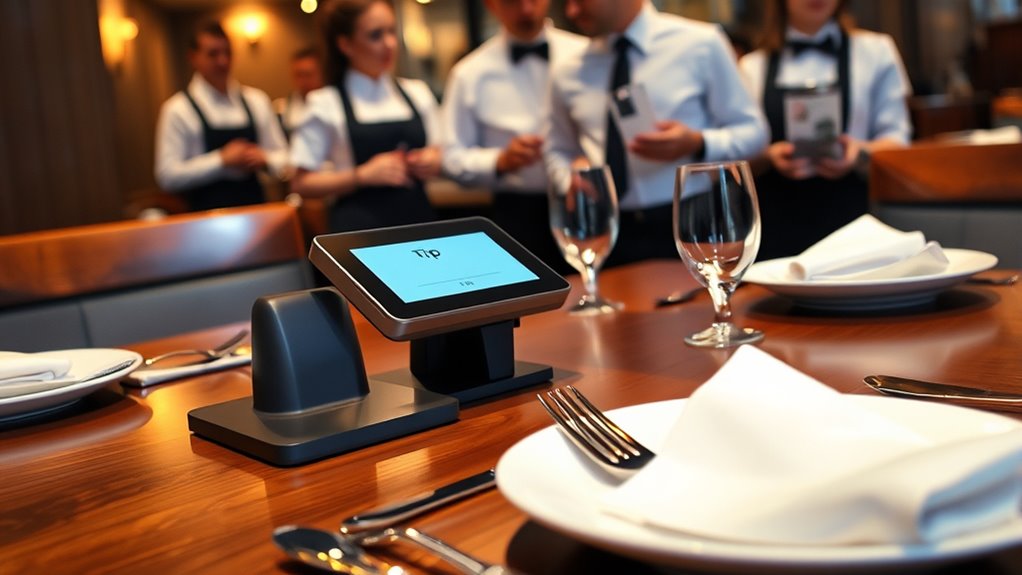As tipping practices shift, many restaurants are reintroducing service charges to make certain of fair wages amid rising labor costs. Instead of traditional tips, you’ll notice automatic fees or transparent pricing, which some see as fair and consistent. This change aims to improve staff income stability and address legal or policy questions. If you keep exploring, you’ll uncover how these trends impact your experiences and what to expect in the evolving hospitality scene.
Key Takeaways
- Rising labor costs and minimum wages are prompting businesses to replace tips with service charges for predictable revenue.
- Growing consumer preference for transparent, fixed pricing encourages the reintroduction of mandatory service charges.
- Automation and AI streamline payroll management, supporting fair wages and reducing reliance on variable tips.
- Differences between tips and service charges impact staff income stability, influencing motivation and benefits.
- Clear communication and legal compliance are essential for a smooth transition to service charges and maintaining customer satisfaction.
The Evolution of Tipping Practices in the Service Industry

The way people tip in the service industry has changed considerably over the years, reflecting broader shifts in social norms and economic pressures. You might remember a time when tipping was a straightforward gesture of appreciation, usually around 15-20%. Over time, tipping became more complex, with expectations varying by region and service type. Today, many customers are more conscious of how tips impact workers’ incomes, especially as wages stagnate. Some establishments even encourage tipping as a way to supplement low base pay. As a result, you may now see more variability in tip amounts, and in some cases, tipping is replaced or supplemented by service charges. This evolution reflects ongoing debates about fair pay and the role of tipping in modern service industries.
Factors Driving the Reintroduction of Service Charges

As economic pressures and changing labor standards reshape the service industry, many establishments are reintroducing service charges to guarantee fair compensation. Rising minimum wages and labor costs make relying solely on tips less sustainable for businesses. Employers seek predictable revenue streams to assure staff are paid fairly, regardless of customer tipping habits. Additionally, the gig economy and fluctuating customer volumes create financial instability, prompting businesses to implement service charges for consistency. Consumer expectations are shifting, with many patrons favoring transparent pricing over variable tipping. Hospitality venues also face legal and regulatory pressures, pushing them toward service charges that are easier to manage and report. Moreover, advancements in automation technologies are influencing operational costs and staffing models, further encouraging the adoption of service charges as a stable income source. Overall, these factors combine to make service charges a strategic response to economic and labor challenges, aiming to support fair wages and operational stability.
Differences Between Traditional Tips and Service Charges

You might notice that traditional tips are usually given directly by customers, often in cash, while service charges are added automatically to bills. This difference affects how staff members are paid and how predictable their earnings are. Understanding these distinctions helps you see how payment methods influence staff income and the overall tipping culture. Additionally, recognizing the impact of service charges can help consumers make more informed decisions about supporting staff fairly.
Payment Method Variations
While traditional tips rely on customers physically handing over extra money, many establishments now include service charges directly in the bill, changing how you contribute to workers’ earnings. Instead of cash or separate tips, you might see a line item added automatically, simplifying the process. This shift affects your payment options and expectations. Proper tipping etiquette is evolving as these changes become more widespread across the hospitality industry.
Impact on Staff Earnings
Traditional tips directly increase a worker’s income, giving you the flexibility to reward exceptional service. With tips, staff earn based on your generosity, which can vary widely. Service charges, however, are usually included in the bill and go directly to the business, not individual employees. This shift can lead to more consistent earnings but may reduce staff’s motivation to deliver outstanding service. Additionally, some businesses distribute service charges among all employees equally, while tips often reward specific individual efforts. Here’s a quick comparison:
| Aspect | Tips | Service Charges |
|---|---|---|
| Income variability | High variation | More stable |
| Distribution method | Based on individual tips | Usually pooled or fixed |
| Impact on motivation | Encourages personalized service | Less direct incentive |
This change impacts how staff earn and motivates performance differently. Furthermore, understanding the impact of cookies can help businesses optimize their online interactions and transparency with customers.
Impact on Service Workers’ Income and Benefits

You might notice that changes in tipping practices can make service workers’ income less predictable. When tips decline or become less reliable, their overall earnings and benefits could suffer. It’s important to contemplate how these shifts impact their financial stability and access to essential benefits. Additionally, the average duration of divorce proceedings in some states highlights the importance of stability, which can be affected by employment income fluctuations.
Income Stability Concerns
As tipping becomes less predictable, service workers face greater uncertainty about their income and benefits. You might find your earnings fluctuate wildly week to week, making it harder to plan financially. This inconsistency can lead to stress and difficulty covering expenses. Without reliable tips, your access to benefits like health insurance or retirement plans could diminish, especially if employers cut back on support. Additionally, the lack of consistent income may hinder your ability to invest in professional development, which could impact your long-term career prospects.
Benefits and Compensation
Since tips are becoming less reliable, service workers often see their income and benefits diminish. With tipping disappearing or decreasing, employers are shifting toward service charges, which can affect your benefits. You might notice reduced access to health insurance, paid time off, or retirement plans. Some businesses reallocate funds from tips to cover these benefits, but it’s not always enough. Additionally, the shift may influence the overall compensation structure for employees, impacting their financial stability.
Customer Reactions and Perceptions Toward Service Charges

Many customers have strong opinions about service charges, often viewing them as either a fair tip or an unwelcome surprise. Some appreciate the transparency and consistency they bring, while others feel caught off guard by unexpected fees. You might notice that:
- Some see service charges as a way to support staff fairly.
- Others worry they’re hidden costs that diminish trust.
- Many feel confused about whether to tip additionally or rely solely on the charge.
- The way a restaurant discloses service charges significantly influences customer perceptions and satisfaction.
Your perception depends on how clear the restaurant communicates about these fees. If you understand why they’re added and see them as a fair exchange, you’re more likely to accept them. Conversely, if they feel like a hidden cost, it can lead to frustration or dissatisfaction. How you view service charges shapes your overall dining experience.
Business Perspectives: Benefits and Challenges of Service Charges

Service charges offer restaurants a way to guarantee staff are fairly compensated and can help streamline billing processes. By including service charges directly in the bill, you reduce the reliance on customer tipping, leading to more predictable income for your staff. This can improve staff morale and retention, as employees have clearer expectations of their earnings. However, implementing service charges also presents challenges. Some customers may resist or feel uncomfortable with the additional fee, potentially impacting satisfaction and repeat business. You may face backlash if customers perceive the charges as hidden or unfair. Additionally, managing the distribution of service charges requires transparency and effective communication. Balancing these benefits and challenges is key to successfully integrating service charges into your business model. Leadership skills such as clear communication and transparency are essential for addressing customer concerns and ensuring a positive experience.
Legal and Policy Considerations Surrounding Service Charges

Legal and policy considerations play a crucial role in how you implement and manage service charges. You need to understand relevant laws to avoid legal pitfalls and guarantee compliance. Regulations may dictate how you disclose charges to customers, whether they’re considered tips or service fees. Misclassification can lead to legal disputes or fines. Additionally, policies around wage laws and tax obligations influence how you handle service charges. Being aware of affiliate marketing practices and their disclosure requirements can also impact transparency in billing. Failing to adhere to these considerations can result in legal penalties or damaged reputation. Staying informed and consulting legal expertise helps you navigate complex regulations effectively and maintain fair, compliant practices.
Cultural Shifts and Changing Attitudes Toward Tipping

As societal attitudes toward tipping continue to evolve, the traditional expectations around gratuities are shifting considerably. Many people now see tipping as less of an obligation and more of a personal choice based on service quality. This change is driven by increased awareness of fair wages and the desire for more transparent pricing. You might notice that some establishments emphasize inclusive pricing or discourage tipping altogether. Cultural norms are also diverging globally, with some regions valuing tipping highly, while others view it as optional or unnecessary. As a result, your tipping habits are becoming more flexible and context-dependent. This shift reflects broader societal conversations about fair compensation, customer fairness, and the evolving role of gratuities in service industries.
Future Trends in Hospitality Compensation Models

Looking ahead, hospitality compensation models are poised to undergo significant transformation driven by technological advancements and shifting consumer expectations. You’ll see more establishments adopting transparent, fixed pricing structures that eliminate confusion around tipping. Automation and AI will streamline payroll, ensuring fair wages and reducing reliance on variable tips. Additionally, consumers will demand more ethical compensation practices, prompting venues to explore alternative models.
Hospitality compensation is shifting toward transparent pricing and fair wages driven by technology and ethical consumer demands.
- Shift to service-inclusive pricing with built-in wages
- Increased use of digital payment platforms for transparent tipping
- Implementation of standardized, fair wage policies across the industry
These shifts aim to create a more equitable environment for workers and clearer expectations for guests. Embracing these trends will help you stay ahead in an evolving hospitality landscape.

As service charges become more common, it’s important to understand how they impact your expectations and tipping habits. Both consumers and providers should communicate clearly to avoid misunderstandings about compensation. By adjusting your approach, you can navigate this shift smoothly and ensure fair recognition for service.
Adjusting to Service Charges
Adjusting to service charges means reevaluating how you tip and pay for hospitality experiences. With service charges now included, your approach to tipping shifts from mandatory to optional, depending on the establishment. To navigate this change smoothly, consider these tips:
- Check the bill to see if gratuity is included before adding extra.
- Decide if additional tips are deserved based on the quality of service.
- Communicate with staff if you’re unsure about tipping expectations.
Understanding the new norm helps you avoid double tipping or underappreciating staff efforts. Remember, service charges often support staff directly, so your extra tip might be unnecessary or reserved for exceptional service. Staying informed empowers you to make fair, thoughtful decisions that respect the evolving hospitality landscape.
Managing Expectations Effectively
Since service charges are now a common part of the bill, managing expectations is key to avoiding misunderstandings and ensuring a smooth experience for both consumers and providers. Be clear about what the service charge covers and whether additional tipping is expected. Communicate openly—if you’re unsure, ask your server or staff for clarification. As a provider, set transparent policies so customers know what to expect and avoid surprises. Adjust your attitude; recognize that service charges are meant to supplement, not replace, good service. For consumers, remain respectful and considerate of staff efforts; for providers, maintain professionalism regardless of the new norm. Clear communication and realistic expectations help everyone navigate this shift smoothly, fostering mutual understanding and better experiences.
Frequently Asked Questions
How Do Service Charges Affect Overall Pricing Transparency?
Service charges impact overall pricing transparency by making costs clearer upfront. When these charges are included in the bill, you know exactly what you’re paying for, reducing surprises. It shifts the focus from tipping to a straightforward fee, which can help you better understand how much of your payment goes to staff. Overall, this creates a more transparent pricing system, making your dining experience simpler and more predictable.
Are Service Charges Mandatory or Optional for Customers?
You might wonder if service charges are mandatory or optional. Typically, they’re added automatically to your bill, making them mandatory in many places, especially when clearly stated. However, some establishments give you the option to opt out or discuss the charge. Always check your bill to see if a service fee is included, and don’t hesitate to ask staff if you’re unsure whether it’s optional or expected.
How Do Service Charges Influence Employee Satisfaction and Morale?
Imagine a world where your tip is your thank you — service charges change that melody. When service charges are included, employees often feel more secure and appreciated because they’re guaranteed compensation. This boosts morale and job satisfaction, making your experience better. You can help foster a positive environment by understanding how these charges support workers, turning a simple meal into a shared moment of mutual respect.
What Legal Regulations Govern the Implementation of Service Charges?
You need to understand that legal regulations for service charges vary depending on your location. Generally, laws dictate whether service charges are considered part of wages, how they must be reported, and if they’re subject to taxes. You’re responsible for ensuring transparency with customers and proper distribution to employees. Check local labor laws and employment regulations to stay compliant, as failure to do so could lead to legal issues or penalties.
Will Tipping Eventually Become Obsolete Due to Service Charges?
Did you know that nearly 80% of diners prefer inclusive pricing over tipping? You might wonder if tipping will become obsolete with service charges returning. While some establishments shift towards bundled costs, tipping still plays a role in rewarding personalized service. However, as service charges become more common, tipping may decline, but it probably won’t disappear entirely, especially where personalized service is highly valued.
Conclusion
As tipping practices evolve, over 70% of customers now prefer transparent service charges, ensuring fairer pay for workers. Embracing these changes helps you support better wages and benefits for service staff, creating a more equitable industry. While it might feel unfamiliar at first, understanding these shifts allows you to navigate payments confidently. Adapting to this new norm benefits everyone—so next time, consider the impact behind your bill and stay informed.









